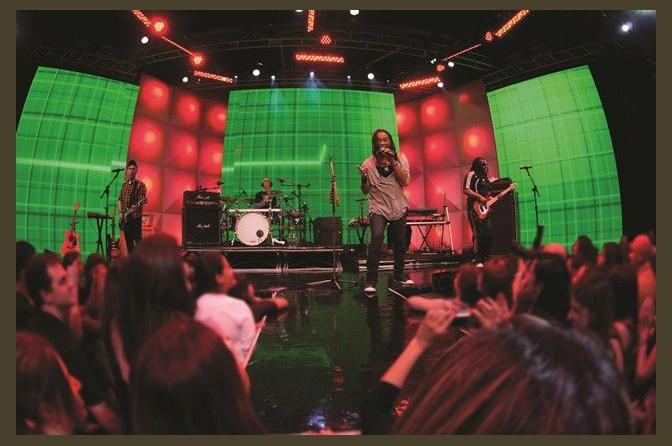 Papas da Língua
Papas da Língua
Papas da Língua: A Musical Journey of Linguistic Alchemy
In the realm of Brazilian music, the band Papas da Língua stands out as a linguistic alchemist, transforming words into vibrant melodies and thought-provoking lyrics. Their iconic song, "Eu Sei," has become a timeless anthem of the band's unique artistic expression.
Origins and Challenges
Papas da Língua emerged in the early 1990s in the eclectic city of Rio de Janeiro. The band's founders, Sérgio Britto and Zé Luiz Mazziotti, shared a passion for music, literature, and the transformative power of language. Their early performances were marked by their experimental sound and often surreal lyrics, which challenged conventional music norms.
One of the band's most significant challenges was breaking through the mainstream music scene. Their unique style did not immediately resonate with the general public, and they faced criticism for being too esoteric. However, Papas da Língua remained steadfast in their artistic vision, believing in the transformative power of their music.
Discography and Artistic Evolution
Papas da Língua released their debut album, "Falamansa," in 1991. The album introduced the band's signature sound, blending samba, rock, and experimental elements. Over the years, they released a series of critically acclaimed albums, including "Sarau" (1996), "Quebra-mar" (1998), and "Vamo Batê Lata" (2002).
Each album showcased the band's linguistic virtuosity and their ability to create catchy melodies that carried thought-provoking messages. Papas da Língua's lyrics often explored themes of love, loss, and the search for meaning in a chaotic world.
Members and Controversies
The core members of Papas da Língua include Sérgio Britto (vocals, guitar), Zé Luiz Mazziotti (vocals, guitar), and Luciano Maia (bass). Over the years, the band has welcomed various guest musicians, adding to their diverse musical tapestry.
Papas da Língua has not been immune to controversies. In 2016, the band faced backlash for their political stance in a song criticizing the then-president Dilma Rousseff. However, the band has always remained true to their beliefs and used their music as a platform for social and political commentary.
Legacy and Influence
Papas da Língua's contributions to Brazilian music are undeniable. Their unique fusion of genres and their masterful use of language have inspired generations of musicians. The band's songs have become part of the soundtrack of Brazilian culture, and their legacy as linguistic alchemists will continue to resonate for years to come.
In the realm of Brazilian music, the band Papas da Língua stands out as a linguistic alchemist, transforming words into vibrant melodies and thought-provoking lyrics. Their iconic song, "Eu Sei," has become a timeless anthem of the band's unique artistic expression.
Origins and Challenges
Papas da Língua emerged in the early 1990s in the eclectic city of Rio de Janeiro. The band's founders, Sérgio Britto and Zé Luiz Mazziotti, shared a passion for music, literature, and the transformative power of language. Their early performances were marked by their experimental sound and often surreal lyrics, which challenged conventional music norms.
One of the band's most significant challenges was breaking through the mainstream music scene. Their unique style did not immediately resonate with the general public, and they faced criticism for being too esoteric. However, Papas da Língua remained steadfast in their artistic vision, believing in the transformative power of their music.
Discography and Artistic Evolution
Papas da Língua released their debut album, "Falamansa," in 1991. The album introduced the band's signature sound, blending samba, rock, and experimental elements. Over the years, they released a series of critically acclaimed albums, including "Sarau" (1996), "Quebra-mar" (1998), and "Vamo Batê Lata" (2002).
Each album showcased the band's linguistic virtuosity and their ability to create catchy melodies that carried thought-provoking messages. Papas da Língua's lyrics often explored themes of love, loss, and the search for meaning in a chaotic world.
Members and Controversies
The core members of Papas da Língua include Sérgio Britto (vocals, guitar), Zé Luiz Mazziotti (vocals, guitar), and Luciano Maia (bass). Over the years, the band has welcomed various guest musicians, adding to their diverse musical tapestry.
Papas da Língua has not been immune to controversies. In 2016, the band faced backlash for their political stance in a song criticizing the then-president Dilma Rousseff. However, the band has always remained true to their beliefs and used their music as a platform for social and political commentary.
Legacy and Influence
Papas da Língua's contributions to Brazilian music are undeniable. Their unique fusion of genres and their masterful use of language have inspired generations of musicians. The band's songs have become part of the soundtrack of Brazilian culture, and their legacy as linguistic alchemists will continue to resonate for years to come.